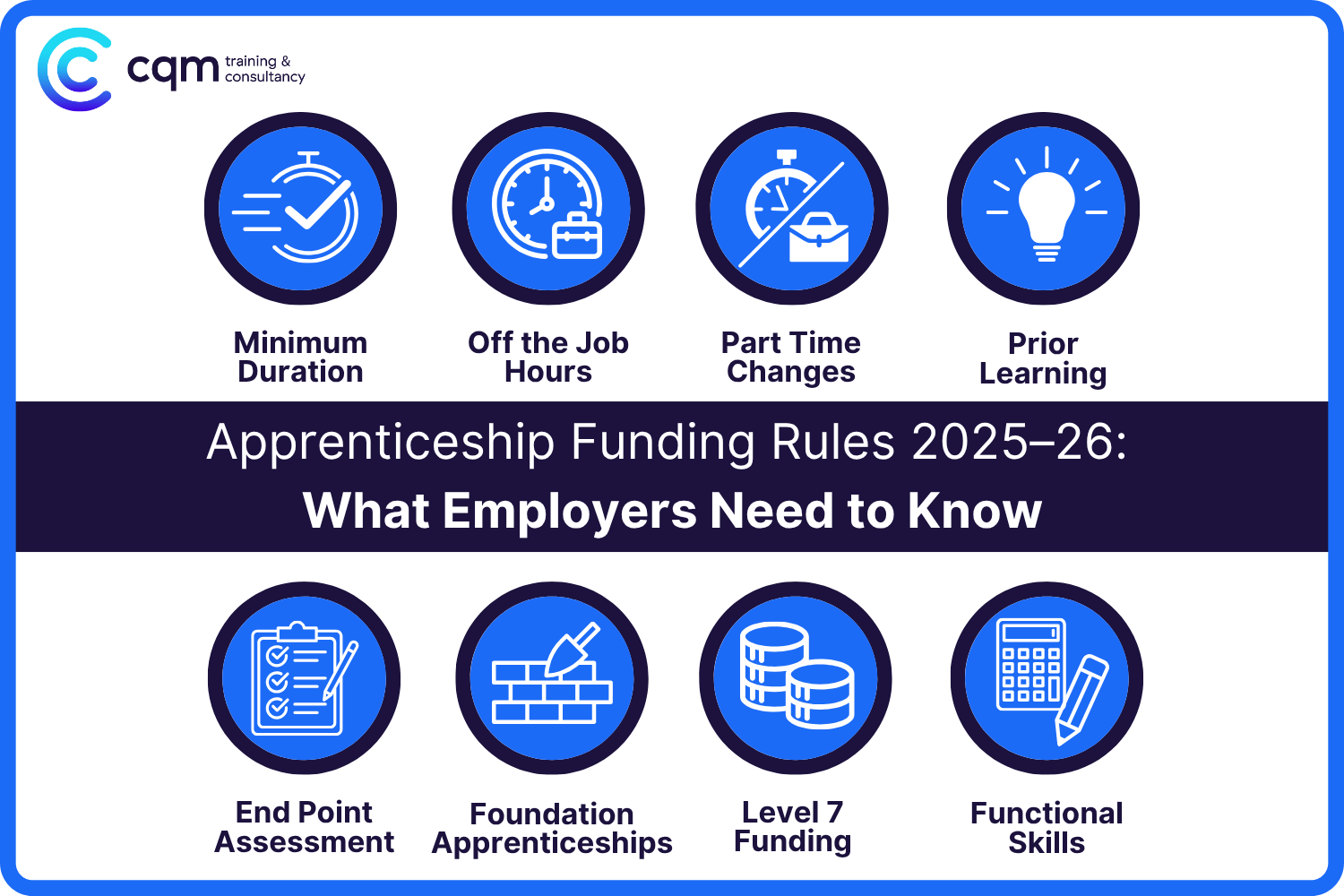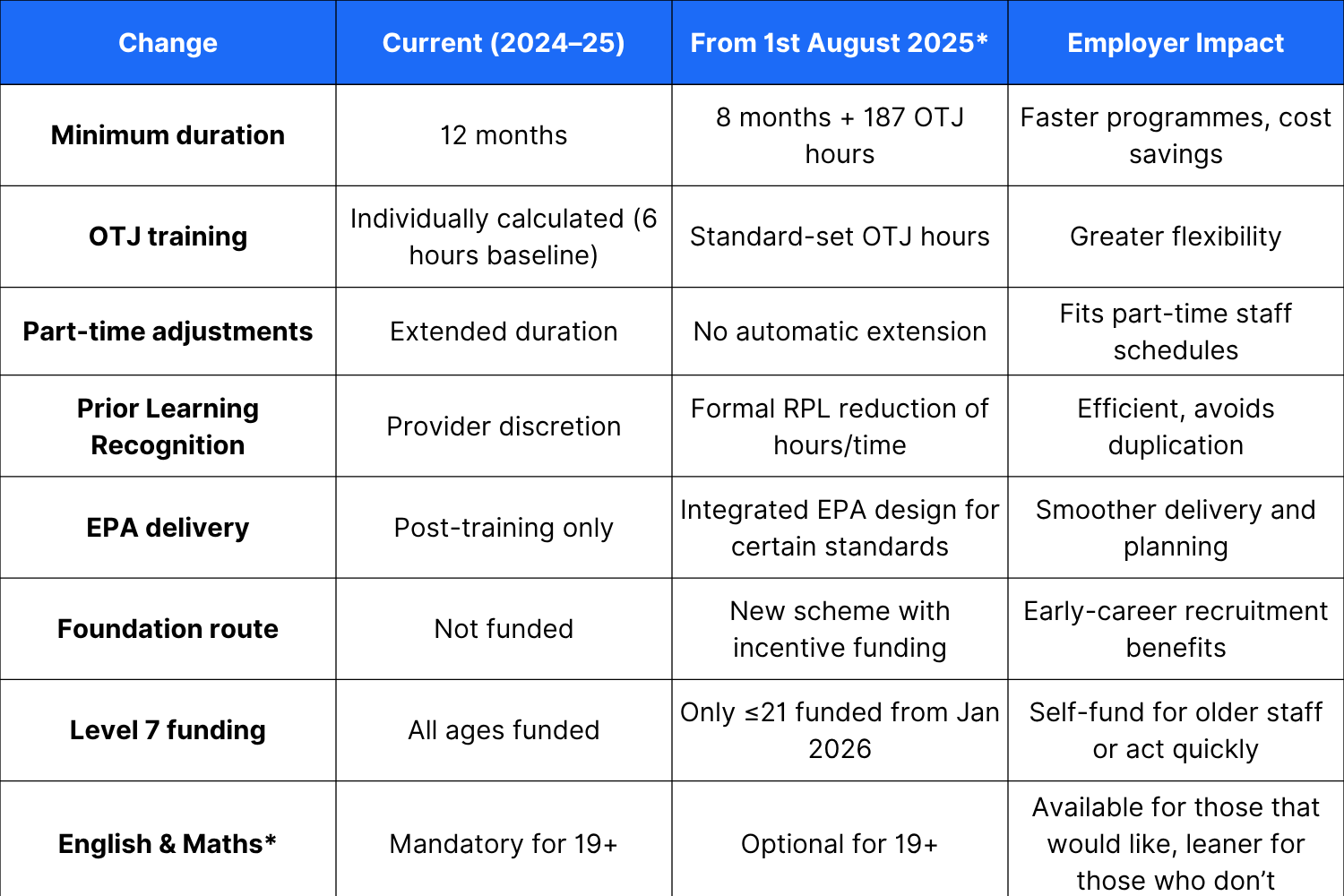Articles
Apprenticeship Funding Rules 2025–26: What Employers Need to Know
Apprenticeship Funding Rules 2025–26: What Employers Need to Know
CQM Training & Consultancy is here to help employers navigate the significant updates to apprenticeship funding coming into effect for starts from 1 August 2025. These changes aim to bring greater flexibility, clarity, and inclusivity – but they require action from employers to stay ahead.
We’ve created a simple guide below that explains some of the key changes, and as always, our friendly team would be happy to explain the impacts in more detail particularly in regard to the apprenticeships we deliver such as Food Industry Technologist Level 3 and Improvement Specialist Level 5 (Lean Six Sigma Black Belt).

1. Minimum Duration: From 12 Months → 8 Months
Now: Apprenticeships must last at least 12 months and one day.
From 1 Aug 2025: Minimum term reduced to 8 months, with a required 187 off-the-job (OTJ) hours (where recognised prior learning exists)
Employer impact: Enables faster qualification pathways for experienced individuals, which in turn accelerates competency gain and return on investment and avoids duplication for the learner.
2. Off‑the‑Job Training: Fixed OTJ Hours, Not Percentage
Now: A flat baseline of six hours per week used to calculate individual off-the-job training hours (OTJ – previously 20% of normal working hours).
From 1 Aug 2025: Each standard has its own total OTJ hours which must be met, providing greater flexibility as these can be delivered over timescales agreed with the provider (and above the minimum duration of 8 months).
Employer impact: OTJ scheduling becomes more versatile and standard-specific, with any increases or decreases in duration, not impacting on the minimum OTJ requirement.
3. Part-Time Rules Removed
Now: Longer durations automatically required to meet the OTJT hours required.
From 1 Aug 2025: No automatic extension – OTJ can be planned to fit actual working patterns.
Employer impact: Becomes more attractive to part-time/apprentices with shifts, no need to extend training duration.
4. Enhanced Recognition of Prior Learning
Now: Limited recognition of prior learning (RPL) depending on provider discretion, however this should be happening already.
From 1 Aug 2025: Formal process to reduce programme length and OTJ hours for prior knowledge.
Employer impact: Staff with relevant skills can avoid repeating known content, shortening time-to-competence.
5. End‑Point Assessment (EPA) Integration
Now: EPA occurs after structured training (gateway stage).
From April 2025: Where appropriate EPA plans are being redesigned permitting integration into training which is looked at on a standard-by-standard basis – currently no changes have been made and won’t be applicable to all standards.
Employer impact: Smoother training – EPA can be incremental and built-in, avoiding end-stage pressure, as well as being more aligned with organisational project cycles.

6. Foundation Apprenticeships Introduced in 7 sector areas
Now: Foundation routes are not part of the core apprenticeship funding.
From 1 Aug 2025: New Foundation Apprenticeships for ages 16–21 (and 22–24 with an Education and Health Care Plan/Care Leaver or Prisoner/Prison Leaver), with up to £2,000 employer incentive subject to retention and progression.
Employer impact: Cost-effective entry-level pipeline for emerging talent, giving young people a route into careers in critical sectors.
7. Level 7 Funding Restriction from Jan 2026
Now: Levy funding available for all ages on Level 7 apprenticeships.
From 1 Jan 2026: Only available for apprentices 21 or younger at start. Employers of older participants must self-fund.
Employer impact: For higher level apprenticeships, these will need to be factored into employer’s training budgets post January 2026 depending on individual
8. Maths & English Requirement Relaxed
Now: Apprentices aged 19+ without Level 2 English or maths must achieve them before undertaking EPA.
From Feb 2025: Requirement for the achievement of maths/English for 19+ is optional at the discretion of the employer.
Employer impact: Still the option to upskill in Maths & English but as it is no longer mandatory provides flexibility for these who do not wish to attain this.
Summary Table

*in effect from February 2025
Conclusion on Apprenticeship Rule Changes
The 2025/26 apprenticeship rule changes offer new opportunities for flexibility, funding efficiency, and faster workforce development – but only for employers who are prepared.
Working with an experienced training provider like CQM Training & Consultancy ensures you not only understand the new rules, but that you capitalise on the benefits.
But remember – apprenticeships aren’t the only solution.
If you’re looking for efficient, more targeted upskilling, whether it’s Lean Six Sigma, leadership, or technical development, our commercial training courses offer:
- Flexible delivery with quicker time to competence – check out our latest video with Carlsberg Britvic (Lean Six Sigma Green Belt – Key Outcomes)
- The same value-add and impact as apprenticeships.
- No funding rules to navigate, making them simpler and more streamlined.
- Upskilling for those outside of England, to ensure consistency across your teams wherever they may be based.
We support organisations who would like to utilise apprenticeship funding or pay for training on a commercial basis. Our team would be delighted to learn more about your upcoming plans for 2025/26 and beyond, and how we can help navigate the latest rule changes and options available to you.
Please get in touch via our contact form below, or simply send over your query to enquiries@cqmltd.co.uk
Contact us
Frequently Asked Questions
How do apprenticeships in England work?
Apprenticeships in England are work-based training programmes that combine practical on-the-job experience with structured learning. Apprentices are employed in a real job while studying towards a recognised qualification, which is carried out through off-the-job training.
Programmes typically last 8–24 months (from 1st August 2025), depending on the level and prior experience. They are funded through the Apprenticeship Levy (for large employers) or government co-investment (for smaller ones). Apprenticeships are available at various levels – from foundation/entry-level to degree and master’s level and are designed to develop skilled, productive employees tailored to business needs.
What is off the job training?
Defined as training, which;
- is delivering new knowledge, skills and behaviours,
- is directly relevant to the apprenticeship,
- is delivered in the apprentice’s normal working hours (but outside of their productive job role) and excludes ineligible activities such as standalone English and maths qualifications.
The volume delivered must be based on the published minimum requirement for the standard, adjusted to account for evidenced prior learning that has been identified in the initial assessment of the apprentice.
What is prior learning?
Previous learning that may count towards an apprenticeship. For example, work experience, education, training and qualifications. Before a learner starts an apprenticeship, providers must do an initial assessment of their existing knowledge, skills and behaviours (KSBs) to check if they are eligible, then reduce the cost and content of the apprenticeship if necessary.
Who qualifies for an apprenticeship?
To qualify for apprenticeship funding in England, individuals must be employed (part or full time), spend at least 50% of your working hours in England, and have the right to live and work in the UK.
Individuals need to be 16 or older, and the apprenticeship must provide new knowledge, skills, and behaviours (not duplicate existing qualifications). Employers may access funding through the Apprenticeship Levy or government co-investment, depending on their size. Additional incentives are available for younger apprentices or those with additional needs.
Why consider an apprenticeship with CQM Training & Consultancy?
CQM Training & Consultancy specialises in high-impact, work-based training that delivers real results. Our apprenticeships are designed to develop practical, in-demand skills in areas like continuous improvement, leadership, and food technology.
We tailor our delivery to your workplace, provide expert tutor support, and align training with your business goals. With a proven track record of supporting both learners and employers, CQM helps apprentices thrive and businesses grow.